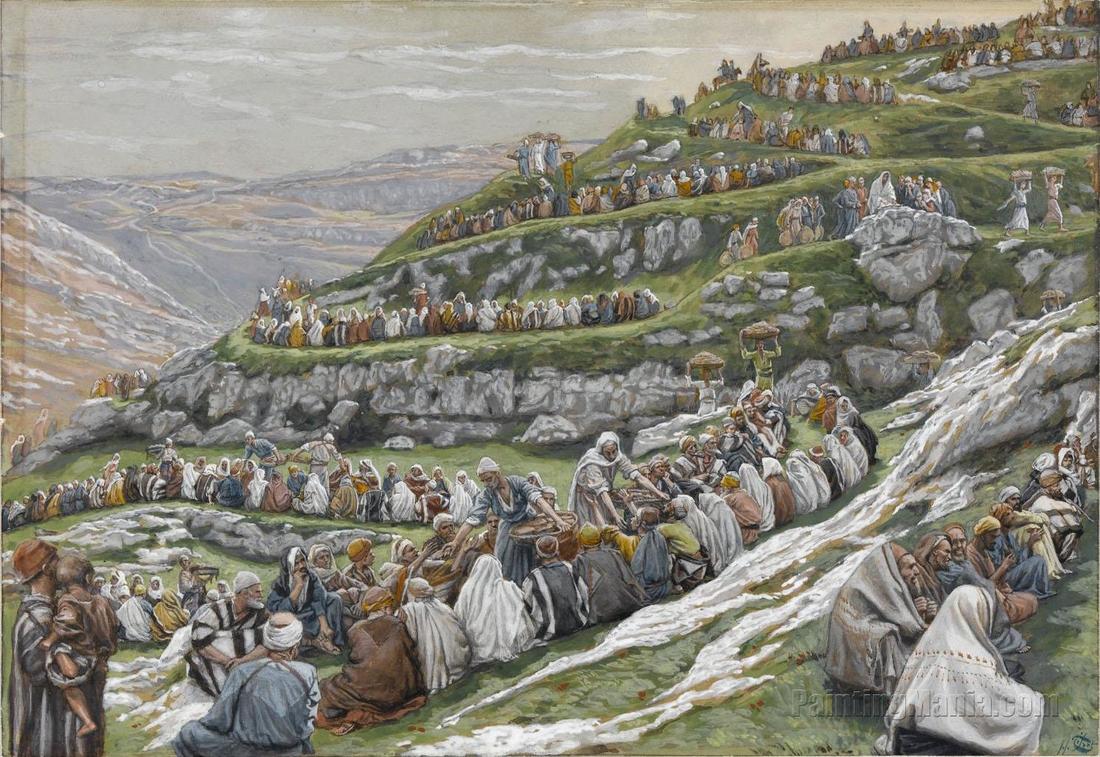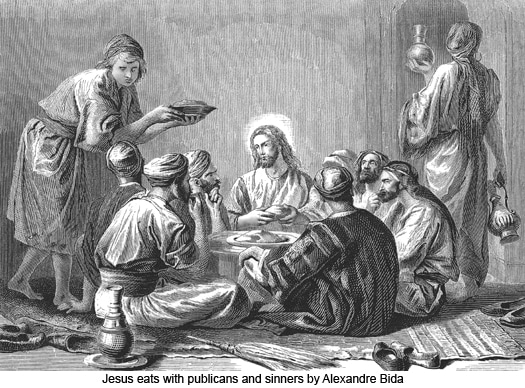July 30, 2017
Last week we learned that we are all sinners, who fall short of the glory of God, and that we cannot by our own works earn the righteousness required to enter eternal life. But rather we are saved by grace (that is a gift from God) through faith in Jesus Christ alone, who gives us his own righteousness. You cannot save yourself. God saves you without your works and despite your sin.
Since we are saved by grace through faith in Jesus Christ alone without our works, does this mean that we can then continue to sin? Do we describe our relationship with God in this way: "I like to sin, God likes to forgive, so I just go on sinning."? Certainly no one could actually believe such a thing! Yet many behave as if this is true and many others slanderously accuse Christians, particularly Lutherans of teaching this (Romans 3:8).
Yet we heard St. Paul address this very topic last week in our Epistle Lesson. He writes, "What shall we say then? Are we to continue in sin that grace may abound? By no means. How can we who died to sin still live in it? Do you not know that all of us who have been baptized into Christ Jesus were baptized into his death? We were buried therefore with him by baptism into death, in order that, just as Christ was raised from the dead by the glory of the Father, we too might walk in newness of life." (Romans 6:1-4) and later St. Paul concludes, "So you also must consider yourselves dead to sin and alive to God in Christ Jesus." (vs. 11)
And this week, immediately before the start of our Epistle Lesson St. Paul again argues, "What then? Are we to sin because we are not under law but under grace? By no means! Do you not know that if you present yourselves to anyone as obedient slaves, you are slaves of the one whom you obey, either of sin, which leads to death, or of obedience, which leads to righteousness? But thanks be to God, that you who were once slaves of sin have become obedient from the heart to the standard of teaching to which you were committed, and have become slaves of righteousness." (Romans 6:15-18)
St. Paul is not simply using figurative language. In Baptism you all died to sin. Sin previously ruled over your bodies from your very conception. We were all dead in our trespasses and sins (Eph. 2:1) and because of this we were incapable of doing anything good or pleasing to God (1 Cor. 2:14). In Baptism you were put to death with Christ, so that your sins would be drowned in his blood. This isn't simply a metaphor. No, your heart didn't stop beating nor did your soul depart your lifeless body. But you did die and come back to life. In a much realer way than you can imagine. Scripture calls it a washing of regeneration and renewal of the Holy Spirit (Titus 3:5). The Holy Spirit really did come to you and change you in a remarkable way. He woke you from your sleep of death in sin. You were by nature incapable of choosing God or doing anything but sin. The Holy Spirit changed you, so that you can live in Christ; today, tomorrow, and forever. Your new life cannot be separated from Christ Jesus. Otherwise you would fall back into the pit of sinful death.
Likewise, it is not simply a figure of speech that we were slaves to sin. A slave must be obedient to his master. Paul makes perfect sense when he tells us, "Do you not know that if you present yourselves to anyone as obedient slaves, you are slaves of the one whom you obey?" You were born a slave to sin. And whenever you sin you enter into servitude to sin.
People think freedom is having the choice to do whatever you want; freedom to eat and drink what you want, to marry whomever you want, to say whatever you want, to do whatever you delight in doing. But Scripture makes clear that this is not freedom. It is not freedom to sin. Rather, sin is your slave master. You are not free if you do whatever you want independent of what God says or what is in the best interest of your neighbor. If you follow the desires of your heart or the course of this world, you are not free, but a slave.
When Christ set you free from slavery to sin he did not break your bonds so that you could continue to serve your former master. He freed you so that you could serve him! This is why the Holy Spirit has stirred your heart, giving you a new birth of the Spirit! We should all cling tightly to our hero, who set us free from our bondage! As that great hymn declares, "Lord, Thee I love with all my heart; I pray Thee, ne'er from me depart, with tender mercy cheer me. Earth has no pleasure I would share. Yeah heav'n itself were void and bare If Thou, Lord, wert not near me. And should my heart for sorrow break, My trust in Thee can nothing shake. Thou art the portion I have sought; Thy precious blood my soul has bought. Lord Jesus Christ, my God and Lord, my God and Lord, Forsake me not! I trust thy Word!"
Christ has rescued us from a terrible situation. We could not control our own bodies, but were slaves to sin leading to death and hell. And Christ broke the bands of our sin. He freed us and gave us eternal life. And so we should want to hold fast to Jesus! A moment away from him should be a terror to us. Because if we leave Christ we will soon be enslaved again, to serve the flesh and Satan, and be doomed to hell.
Many treat Christ as if he is a hated, yet wealthy uncle. He dies and leaves you a great inheritance. You still hate him, but figure since he made you rich you'll raise a toast for him once a year. But that is in no way our relationship with Christ. Christ made us alive so that we might walk in him. He freed us from slavery, so that we might serve him. We should love Jesus our Savior and hate bitterly our sins for which we are ashamed.
"You have been set free from sin and have become slaves of God." To be set free from sin means to become a slave of God. If you are not a slave of God you are a slave of sin. This seems like a contradiction, but it is not. True freedom is to be a slave of God. Because if you do not obey God and his righteousness then you are obeying sin. Either sin is your master or God is.
This might not make you feel good. Who wants to be a slave? I want to be free! But slavery to God is the greatest freedom. Because the will of God is always good. Slavery to sin leads to unhappiness, shame, and death. Slavery to God leads to blessedness, a clear conscience, and eternal life. Sin demands that you serve it to your own hurt and the hurt of those around you. God demands that you love him, who died for you and rescued you from death. Sin cares nothing for your neighbor and knows nothing of love. God is love and demands that if you love him you must also love your neighbor.
But aren't we God's children? How can we be God's slave if we are his children? Yes, we are God's children through faith and Baptism. And Christ Jesus is our brother. And we the Church are Christ's holy Bride and he is our Bridegroom. But we should not shy away from the title, "slave of God." The Virgin Mary herself, who will forever be known as the Mother of God, because her son according to the flesh, Jesus Christ, is at the same time God, even Mary spoke to the angel Gabriel when he told her she would bear the Savior, "Behold, I am the slave of the Lord; Let it be to me according to your word." (Luke 1:38)
When we call ourselves slaves of God we do not mean it in a derogatory way or to imply that God is a wicked slave master, who beats and terrorizes us. No, it means that we want more than anything in the world to do what God wants us to do. To be of service to God is our greatest joy.
I am currently reading the Fellowship of the Rings, the first volume in the Lord of the Rings series by J. R. R. Tolkien. As in many good novels there are great relationships that develop among the characters. Perhaps my favorite one is Sam to Frodo. Sam is Frodo's servant. And throughout their adventure there is nothing that Sam wants to do more than to serve Frodo, to help him, to be at his side in danger or in safety. It's a beautiful relationship, because it illustrates in a small way our relationship with God. We should want to always be with him. This means we want to hear his Word and learn it. To receive his absolution and the Lord's Supper. This should be our greatest delight. This means we should want to serve our neighbor, to help those who are in need, to speak well of others, and to show them the love God has shown us in Jesus.
Yet most people do not think this way. It is a little thing for them to forego hearing God's word preached for weeks, months, or years. They don't hunger for God's forgiveness or Christ's body and blood. In short, they think the Gospel isn't a big deal. There are more important things than Christ and his forgiveness. If you don't pay your electric bill your electricity will be shut off. If you don't show up to work you'll lose your job. And the church isn't going anywhere. "I can always find Jesus when I need him." People think the Gospel isn't a big deal, because they think their sin is not a big deal. But Scripture makes clear, the wages of sin is death. And this is not simply death of the body. This is eternal damnation. Our sins are serious. And for this reason it is more important for us to hear the Gospel and to be in the service of God than to pay our bills or work or relax or whatever else we think is more important.
The crowd of 4,000 were with Jesus in a desolate place for three days and they didn't have anything to eat. They clearly weren't thinking about their earthly needs. We'd call them irresponsible. Jesus calls them faithful. They sought after what was more important than food or any other treasure in this life. They wanted to be with Jesus, to hear his words that give eternal life. And as Jesus promised, "Seek first the kingdom of God and his righteousness and the rest will be added unto you," he also provided for their physical needs. He fed them to their fill.
"The wages of sin is death, but the free gift of God is eternal life in Christ Jesus our Lord." Notice how St. Paul didn't say that the wages of sin is death, but the wages of good works is eternal life in Christ Jesus. You earn your death and damnation with your sins. You do not earn eternal life in Christ by your works. Eternal life is a free gift. Yes, it is your duty as a Christian, as a slave of God to do good works. Yet, if ever we were to misconstrue our duty to do good works as a mission to earn eternal life, we would fall into despair.
We do not serve God in hopes that if we are good enough we will go to heaven. We serve God, because he has rescued us from death and hell. We cling close to our master, because he gives us a clean conscience no matter the sins of our past. We cling to God, because when we sin he always forgives us.
The Gospel is the greatest teaching in the world. It tells us that Jesus bore our sin on the cross. Sometimes we glaze over those words. What do they mean? What do you think of when you think of Jesus bearing your sins? It means Jesus felt your suffering, sin, and shame. He died to your sins, washing them away in his own blood. This isn't just rhetoric. Jesus knows exactly how you feel. In fact, he felt the guilt you would feel over your sins if you could possible comprehend their weight.
You are no longer a slave of sin, because Christ has set you free. And even in your weekly and daily life, Christ defeats sin for you and in you. By the power of his Holy Spirit you overcome temptation. And by the power of his blood you are forgiven when you fall. This is why you cling to Christ. He gives you life. This is why you strive to do good. Not to earn your salvation, but to serve him who won for you salvation. To cling to Christ your God, to be bound to him is the greatest freedom. Amen.




 RSS Feed
RSS Feed